I’m a postgraduate student at the
University of Cambridge,
where I study human-inspired AI with a focus on AI-driven interface development.
My passion lies in designing interactive experiences powered by human-in-the-loop intelligent systems, and I’m currently interested in
how such technologies can support ecological conservation and the study of natural environments.
Previously, I worked as a Software Engineer at
Stellar Cyber
in San Jose, California, where I developed AI-driven interfaces for
threat hunting
[AIM Research, 2024]
and human-augmented autonomous cybersecurity operations powered by
agentic AI
[Business Wire, 2025].
I’m also the creator of
GONEXT,
a generative AI platform that delivers personalized analytics for
League of Legends players.
In my free time, I enjoy being outdoors in nature, going to music festivals, and playing racquet sports.
Current Work
An AI-powered analytics tool for League of Legends that provides
real-time, personalized strategies, matchups, synergies, and builds.
It uses the Riot API to gather live game data, which is then
processed by language models to deliver tailored, game-specific
guidance to players.

This open-source Model Context Protocol (MCP) server empowers LLMs with comprehensive access to League of Legends game data through the Riot Games API. It features over 35 tools and resources for retrieving player statistics, match history, champion information, tournament data, and real-time game monitoring, supporting both stdio and SSE transports for seamless client integration. It is shipped as a Python package and a Docker container. Additionally, a demonstrative MCP client chatbot, leveraging a ReACT agent, is also provided to showcase the server's extensive capabilities and practical usefulness.
docker pull kostadindev/league-mcp
pip install league-mcp

Python package for converting diverse content into a search-engine-friendly knowledge base.
It effortlessly ingests files (PDFs, DOCXs, spreadsheets), websites, and GitHub repositories,
then leverages LLMs to generate a Markdown
knowledge base. Ideal for creating structured and crawlable formats like
llms.txt
and llms-full.txt,
supporting Retrieval-Augmented Generation (RAG) applications, or synthesizing unstructured data from multiple sources.
Capable of summarizing an entire github repostory or website in two lines of code.
pip install knowledge-base-builder



